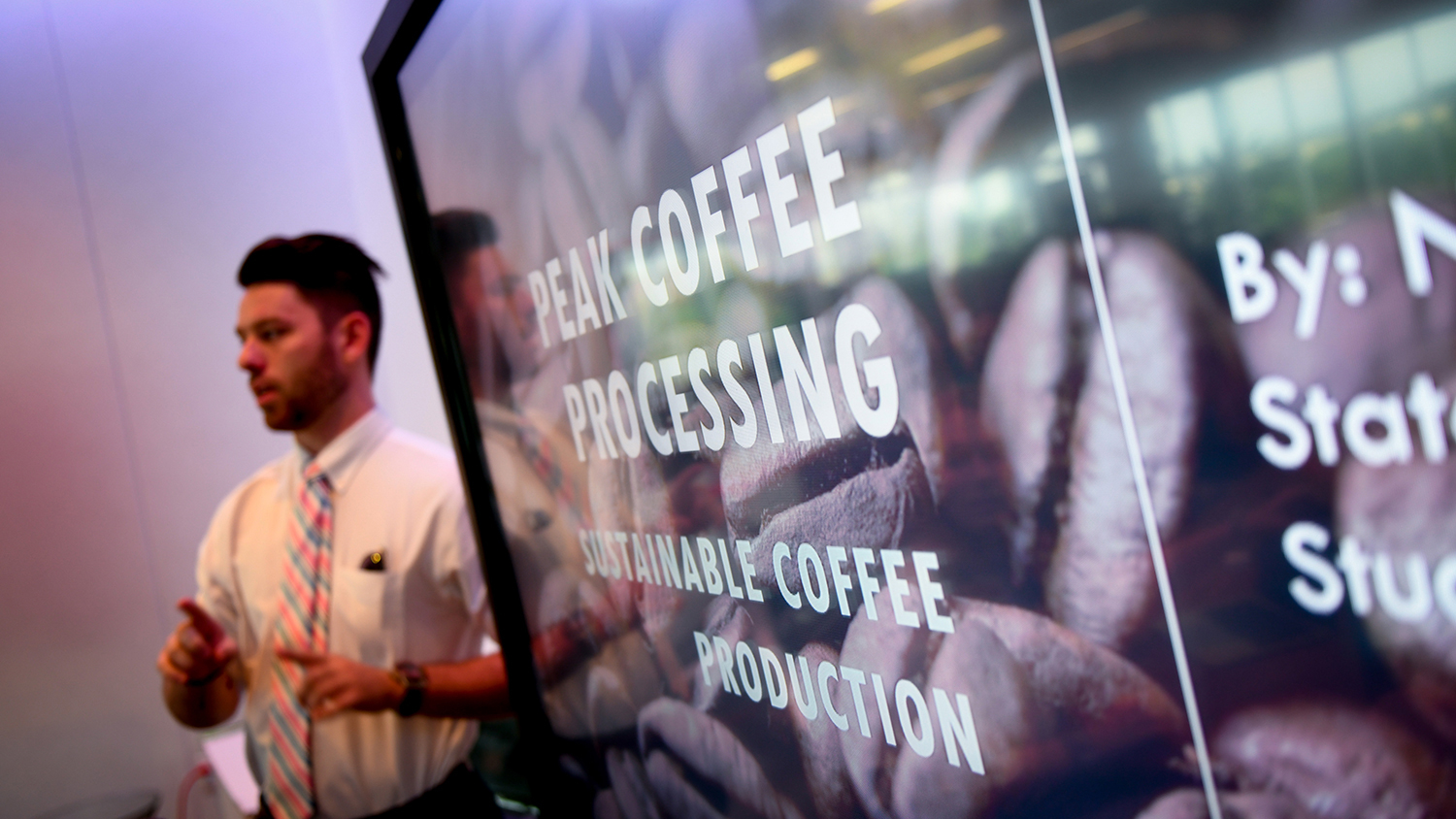Brewing up a sustainable cup

Students’ coffee filtration system earns second-place finish in global competition
On top of classes, extracurriculars and day-to-day student life, it would be difficult to find time to develop a business plan and create a product design in just two months — with the added stress of vying for a chance to represent the United States at an international competition.
But five engineering students made it happen, creating the start-up Peak Coffee Processing and developing a filtration system for coffee production wastewater. They presented their business plan in April in Washington, D.C., along with more than 30 other student teams and earned one of six spots to represent the U.S. in September in London at the 2019 Global Grand Challenges Summit, which is hosted by the U.S., U.K. and Chinese academies of engineering.
The students — Silvana Alfieri, a senior double-majoring in environmental engineering and environmental policy; Kevin Duke, a junior majoring in civil engineering; Rachel Figard, a junior majoring in industrial and systems engineering; Grant Jordan, a junior majoring in industrial and systems engineering; and Pippin Payne, a senior double-majoring in mechanical engineering and religious studies — didn’t know each other well prior to the project, but in the time they’ve spent brainstorming, developing and practicing, they’ve become a cohesive unit.
“I think we’ve all become really close, and that has contributed to it not feeling like work because we all share this vision, and we share the same goals,” Alfieri said.
The NC State team finished second overall in London and first among teams from the United States, receiving a £7,500 prize. Other U.S. teams were from Dartmouth University, Oklahoma State University, UC San Diego, University of Southern California and University of Rochester.
Even before the students knew they’d go to London, they decided together that they wanted to continue growing Peak Coffee Processing.
All five are members of the National Academy of Engineering (NAE) Grand Challenges Scholars Program at NC State, a curricular and extra-curricular program that helps prepare students to solve the NAE’s 14 Grand Challenges for Engineering in the 21st century. Their mentor, Dr. David Parish, assistant dean of academic affairs, sent out the call for an NC State team to go to D.C.
With a wide range of disciplines both within and outside of engineering, the group approached sustainability by trying to find a solution that would benefit both the individual and society. They researched water, food and energy, each coming to the table with their own ideas, before settling on coffee.
“By narrowing the scope, we found ways to combine our talents and perspectives for a project that is not only impactful to others but very feasible as well,” Figard said.
Coffee is the second most traded commodity in the world, surpassed only by oil. Coffee beans grow inside a small fruit similar to a cherry, and are processed using either the dry or wet method. Peak Coffee Processing’s filtration system is designed for wet processing, which starts with using water to sort the coffee cherries by density. The denser coffee cherries sink to the bottom, and the cherry is removed from the bean in a process known as de-pulping. The bean is then fermented in water. The process creates large amounts of wastewater that contains solid particles and has a low pH, which is harmful to environmental and human health when released into local waterways. It can also infiltrate drinking water, and according to some studies, up to 90 percent of people living in areas near coffee-producing areas experience health problems.
To decrease the amount of harmful waste, Alfieri explained, the students developed a filtration system that outputs clean water that can be reused in the coffee production process or can be released into the environment without causing harmful effects. This system leads to a cleaner and safer environment while also allowing coffee producers to produce more coffee, as it generates a fertilizer that increases crop yields and improves the density of the coffee bean, which makes better-tasting coffee. The team is applying for an international patent for their filtration system, which they currently estimate would cost about $2,000 and would be capable of filtering water from 500-gallon drums.
Alfieri and Duke worked on the technical side of the project, talking to professors in the Department of Civil, Construction, and Environmental Engineering and in the College of Agricultural and Life Sciences. During the fall semester, Alfieri will conduct research on a small-scale prototype, making her own coffee wastewater based on chemical composition.
Meanwhile, Figard, Jordan and Payne focused on the business plan, assisted by professors in the Poole College of Management. After being selected as one of 30 schools to compete in D.C., the five students took an intensive entrepreneurship immersion course taught by two professors from the National Science Foundation.
Throughout the process, the students also reached out to local coffee shops to learn more about where they sourced their beans and contacted dozens of coffee bean producers in South and Central America to gauge interest for the filtration device.
Once they had their design and plan developed, the group practiced their presentation to anyone who would listen, including deans in the College, engineering professors and entrepreneurship professors.
In the spring, they plan to apply for entrepreneurship competitions like the Lulu eGames at NC State, as well as other funding sources. They’re looking forward to seeing their idea take off, and they want this technology to one day be implemented at every coffee farm.
“We were invested in the idea more than the outcome,” Jordan said. “We want the project to succeed, and that’s where we’re focused.”
Return to contents or download the Fall/Winter 2019 NC State Engineering magazine (PDF, 2.3MB).
- Categories: